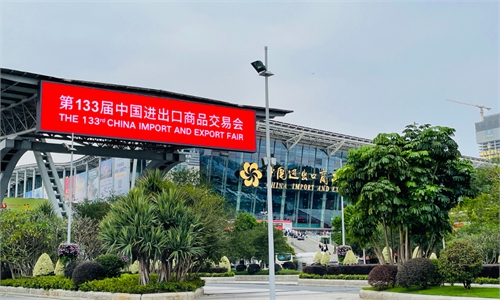
A staff member works at a terminal of Taicang Port, east China's Jiangsu Province, March 13, 2023. Taicang Port in Jiangsu has operated orderly and efficiently. The port saw its foreign trade cargo throughput reach 17.63 million tonnes while the foreign trade container throughput hit 775,000 twenty-foot equivalent units (TEUs) over the first two months this year. (Photo:Xinhua)
China is willing and able to join the Comprehensive and Progressive Agreement for Trans-Pacific Partnership (CPTPP), a senior government official said on Sunday.
Fast-tracking its CPTPP vision, another giant step after the signing of the Regional Comprehensive Economic Partnership (RCEP), the world's largest free trade deal, China has been stepping up efforts in promoting higher-level openness despite economic headwinds caused by the pandemic as well as global geopolitical uncertainties, experts said.
The country has the willingness to join the free trade pact and is advancing efforts on that front, Vice Commerce Minister Wang Shouwen said at a press conference on Sunday.
"We have conducted in-depth research on all the terms of the CPTPP and assessed the costs and benefits by joining the partnership. We believe that China is capable of fulfilling its obligations under the CPTPP," Wang said.
The country has already carried out pilot projects and experiments in some pilot free trade zones and free trade ports in accordance with the requirements of CPTPP rules, standards and management obligations, according to Wang. "When the conditions are ripe, we will promote it on a larger scale."
Aligning with high-standard international economic and trade rules, China officially filed an application to join the CPTPP in 2021, a move that attests to the country's commitment to global trade liberalization despite the pandemic and intensifying efforts by the US to contain China's development.
Wang reiterated the benefits of China's accession to the free trade partnership, which is "in the interests of the country itself, all CPTPP members, and the economic recovery in the Asia-Pacific region and the world as a whole."
"We expect all (CPTPP) members to support China's accession," he added.
For CPTPP members, China's accession means that the consumer base of CPTPP members will triple, which will be a huge market access opportunity, and the pact members' total GDP will expand by 1.5 times, according to the vice minister.
The CPTPP, in its current form, would generate global income gains estimated at $147 billion annually. If China were to join, the gains would quadruple to $632 billion, or one-quarter more than in the original TPP with the US, according to a report by the Peterson Institute for International Economics.
However, to join the agreement, China is still faced with reforms in such areas as state-owned enterprises, experts noted.
Chen Fengying, an economist and former director of the Institute of World Economic Studies at the China Institutes of Contemporary International Relations, told the Global Times on Sunday that complex geopolitical situation, especially growing China-US relations, are the tougher issues. China has been accelerating economic reforms and opening-up.
The country will consider appropriately shortening the list that outlines sectors off-limits to foreign investors in order to push forward high-level opening-up and attract more foreign investment, the National Development and Reform Commission said earlier this month, the latest move of the country's push for wider openness.
"With the rise of unilateralism and protectionism, the accession of China, a powerful advocating voice for inclusive multilateralism, is meaningful," said Song Wei, professor at the School of International Relations and Diplomacy, Beijing Foreign Studies University.
Gao Lingyun, an expert at the Chinese Academy of Social Sciences in Beijing, told the Global Times on Sunday that China should reach out to more CPTPP member states at the current stage to win recognition and build trust prior to official negotiations.
Although Japan, Canada and Australia - the three core member states of CPTPP - have expressed doubts about China's access, it is not entirely impossible for the negotiations to push forward, Song said, since they are aware that with the absence of the US from the bloc, if China is not accepted, it will be difficult to achieve the CPTPP's goals in promoting trade, investment and economic growth in the Asia-Pacific region.
Free trade in the Asia-Pacific region has two wheels -- the RCEP and the CPTPP, said the vice commerce minister.
If China, already a member of the RCEP, joins the CPTPP, it will help the two wheels to move forward, promote regional economic integration, and shore up the stability, safety, reliability and efficiency of local industry and supply chains, Wang said.
The CPTPP, an 11-nation free trade deal that became effective in December 2018, replaced the TPP after the US withdrew from it in 2017 under former president Donald Trump. In addition to existing members - Australia, Brunei, Canada, Chile, Japan, Malaysia, Mexico, New Zealand, Peru, Singapore, Vietnam, the UK has recently joined the bloc.
The agreement covers a broader scope than the RCEP, among other free trade deals China has signed, including stipulations addressing labor and environmental issues.




